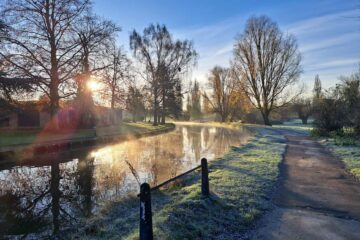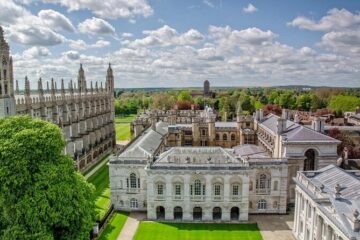This October, dozens of HSPS and HisPol students will arrive in Cambridge excited to be challenged academically and intellectually by new ideas and bold ways of thinking. Few of them know of the dangers: the cult that has grown up in Cambridge around the teachings of an enigmatic figure known only as ‘Thomas Hobbes of Malmesbury’. This cult has claimed the productive lives of untold numbers of Cambridge students. What follows is a cautionary tale, based on a true story.
Michaelmas, First Year
Oh boy, I’m excited to get lectured by David Runciman! I love him on Talking Politics. I wonder what this first lecture will be about: democracy? liberalism? war? international relations?
Huh; he’s just talking about this philosopher Thomas Hobbes. I’ve heard of him before, I guess he must be a big deal? Philosophy isn’t really my thing, but I guess I’ll give this book Leviathan a read. My first supervision is about it too, it must be pretty important.
Lent, First Year
God, it’s weird: we’re now being lectured on all kinds of things, but everything just keeps coming back to Hobbes. I guess that’s why we were taught about him first? Representation, the state, war, anarchy, legitimacy: it’s all derived from Hobbes!
Some of my new friends are a bit sceptical about the relevance of the theory stuff we’re doing first year, but it makes perfect sense to me. I’ve ended up mentioning Hobbes in most of my supo essays, and I’ve enjoyed reading Leviathan—it’s a good book!
Easter, First Year
I’ve spent all my revision time reading Leviathan from cover to cover. (I have even developed hot takes about Hobbes’ theology in Part Three.) This stuff is so exciting, and so relevant; I don’t understand my friends who are complaining about it. They want to “just study actual politics”, but Hobbes defined what modern politics is! I’ve been peeking at second and third year reading lists to try to find more stuff to read about Hobbes.
Michaelmas, Second Year
I’m taking POL7 this year; I started reading De Cive a few weeks before term started to be better prepared for it. I can’t help but seeing everything written before 1651 as merely preparing the ground for Leviathan. Hobbes was both a master synthesiser of ideas and a creative developer of new ones, and gives the most important account what is distinctive about politics today!
On a phone call back home, talking about the latest government policy, my dad frustratedly told me to stop bringing up this Hobbes guy in every political conversation. He just doesn’t get it; I told him to listen to Runciman’s Talking Politics: History of Ideas episode on Hobbes.
Lent, Second Year
I asked for extra supervisions for POL7 just so I could write another essay on Hobbes. My friends from first year are all interested in comparative politics or IR or current affairs, but all I want to talk about is the history of political thought. I’ve ended up chatting about Leviathan in the smoking area on a few nights out.
I went to JCR hustings, and asked the candidates for president a question about their inspirations in the history of ideas. Everyone laughed awkwardly and gave joke-y answers. I RON’d them all.
Easter, Second Year
At Trinity May Ball, I spent several hours in front of the stage yelling at various women about the frontispiece of Leviathan and its perfect artistic depiction of the concept of representation. All of them eventually went to get a drink, and didn’t end up coming back: I suppose they must have gotten lost, because there’s no way they didn’t find Hobbes’ genius interesting.
A couple of my friends have told me that it’s getting weird how often I mention Hobbes, but they don’t understand. POLIS and the History Faculty understand, though. Runciman understands. I fit in here. I might start reading The Elements of Law.
Michaelmas, Third Year
There is no paper this year on which Hobbes is a set thinker, so I have to learn about other people. I heard a friend from the Philosophy Faculty say that third years have an entire optional paper just about Wittgenstein; I have formally complained to POLIS that we don’t have the same thing with Hobbes.
Even still, every text I read is really about Hobbes. We study Montesquieu, I focus on despotism and compare it to Hobbes. We study Rousseau, I focus on sovereignty and compare it to Hobbes. We study Weber, I focus on the state and compare it to Hobbes. I have taken the feminism paper and still write every essay on Hobbes.
I now correct people who say “nasty, brutish, and short” to make sure they add “solitary” and “poore” to the beginning of the quote. I have memorised the chapter of Leviathan “Of Persons, Authors, and things Personated” word-perfect.
Lent, Third Year
The first thing I think about when I wake up is representation. The last thing I think about before I go to sleep is representation.
Cambridge has shown me the truth: everything is Hobbes. The entire constellation of politics, nay, of the human condition can be found within The Elements of Law, De Cive, and Leviathan. I have joined a Facebook group for truthers about squaring the circle. I now greet every new person I meet by saying:
“I Authorise and give up my Right of Governing my selfe, to this Man, or to this Assembly of men, on this condition, that thou give up thy Right to him, and Authorise all his Actions in like manner.”
Easter, Third Year
There is no Mortall God except the Leviathan, and Hobbes is his prophet.
There is no politics, there is only Hobbes.
I’m doing the MPhil.



0 Comments